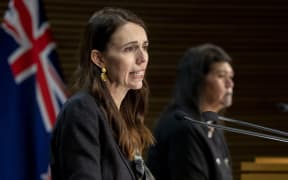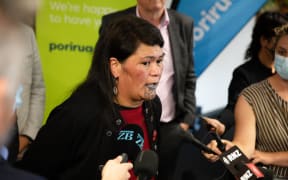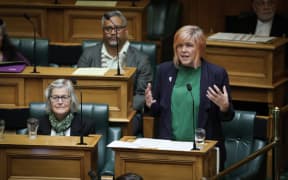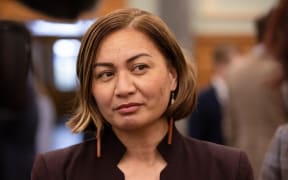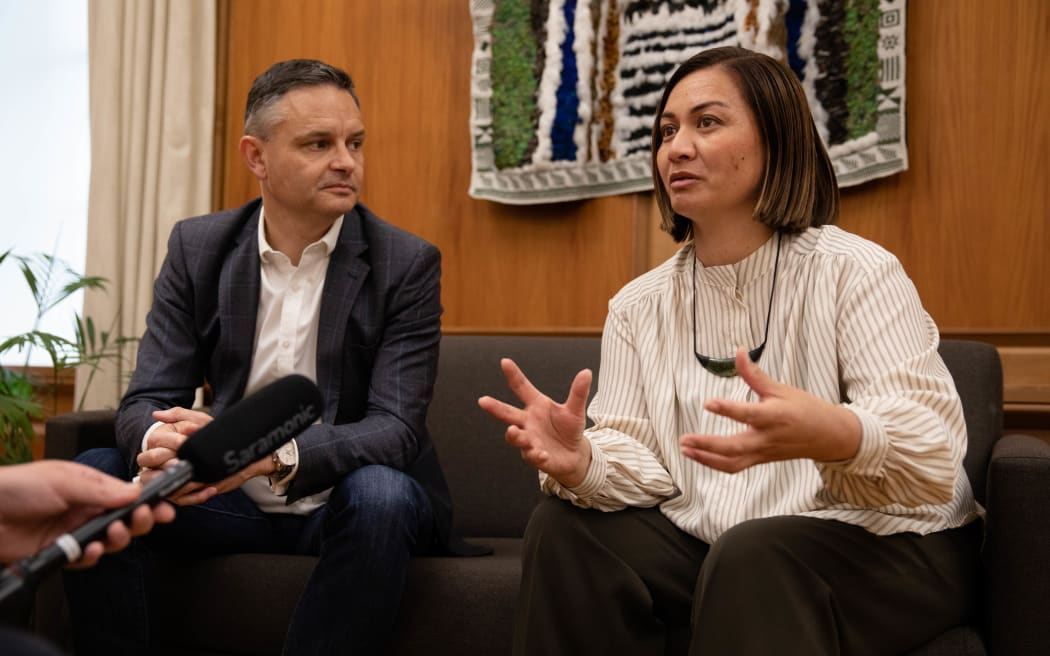
Photo: RNZ / Angus Dreaver
It's hard to say what a normal year in politics looks like. But after 2022, it's clear Marama Davidson and James Shaw are itching for the summer break.
"I think under the circumstances, we've done phenomenally well," says Shaw.
Those circumstances included a period where Shaw was ousted as co-leader (before running un-opposed to regain his position), landmark government work on climate change (and the furious response from the agricultural sector), and the Greens' frustrations at the direction the Covid-19 response has taken.
Despite all of this upheaval, the Green Party is polling consistently near or better than its 2020 election result, which expanded its caucus from eight MPs to 10.
That the Green Party stays in Parliament in some form in 2023 is highly likely. Whether it's still in government is another matter.
In the next term of Parliament, there'll be the end of the first emissions budget period, the start of the second, the decision on the fourth emissions budget from 2036 to 2040, and the next national determined contribution under the Paris Agreement from 2031 to 2035.
Shaw says it's critical the Green Party isn't just in government, but gets seats around the Cabinet table.
"If we're not, those decisions will simply not be as strong as they need to be in order for us to play our part in the fight against climate change."
Davidson also wants to expand the work she has done as associate housing minister and minister for the prevention of family and sexual violence.
The party membership is yet to decide on an election manifesto or any bottom lines for coalition negotiations, but Davidson says the party has made its priorities clear: Climate change and ending inequality.
"We've got prevention of violence priorities, housing is massive for us: we want immediate rent controls to lessen the burden on families who are really struggling."
In partnership with a majority government
Labour's red wave left the Greens with less ministerial influence under a cooperation agreement instead of the confidence and supply agreement they had between 2017 and 2020.
It means they have been free to vote against Labour on matters they feel are important: Often, given Labour's majority, simply to get their objections on the record.
In recent weeks, the Greens opposed the Healthy Homes standards deadline extension, and eventually pulled support from Labour's Three Waters reforms once the public ownership entrenchment clause was removed.
Shaw says it's a "maturing" of the political environment under MMP, and Green members do not expect their MPs to agree with the government on everything.
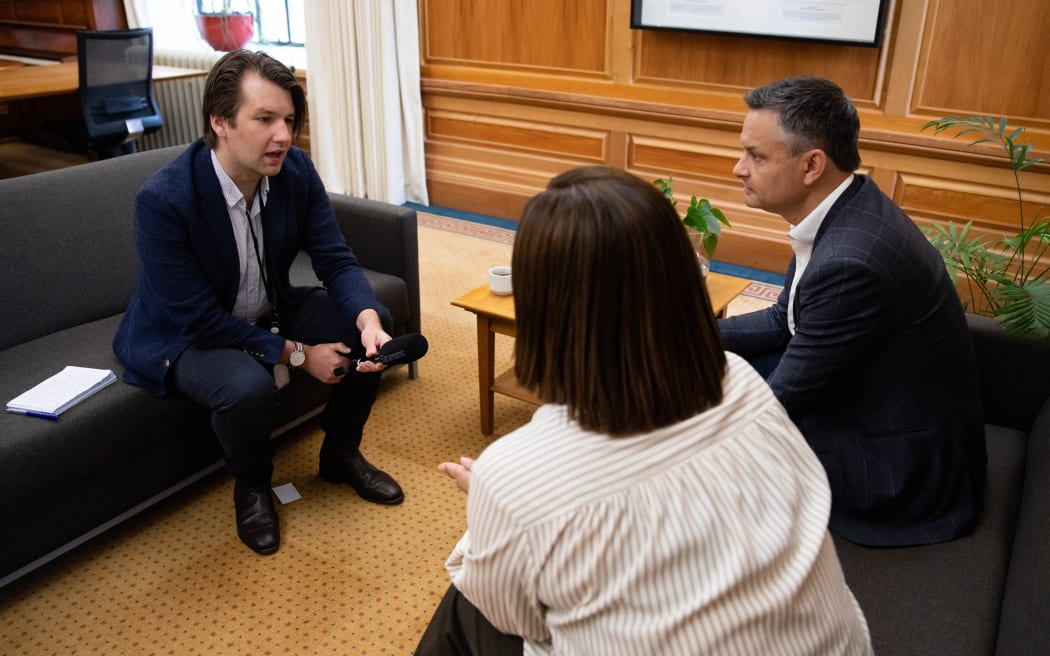
Photo: RNZ / Angus Dreaver
There have been moments when the government has taken an aspect of a Green member's bill, used it to create their own government bill, then used that as a reason to vote against the Green bill.
Davidson describes it as flattering, rather than frustrating.
"We would like to offer that to all political parties, you know, 'Here's our amazing work, help yourself to it'."
Shaw is vocal on his feelings the government's climate policies don't go far enough, despite being its climate change minister. He remains proud of what he has managed to accomplish, including getting 15 ministers to actively lead on different aspects of the climate programme.
He says the priority now is ensuring the climate policy won't get completely unwound.
"I kind of feel like over the last five years we've gotten to the start line but that's got to continue every year for the next several decades, which means it's got to survive multiple changes of government."
National-Green coalition 'hard to imagine'
Of course, Shaw and Davidson are optimistic the only change in government will be one with Green ministers at the cabinet table, able to exert more influence. But with National polling so high, there's the possibility the Greens end up back in opposition.
Every election year the talk of a 'Teal Deal' with National rears its head. Shaw and Davidson are keen to shut it down, but would not entirely rule it out.
"It's Green Party members who actually sign off on any deal. So it's hard to imagine us being able to put a package in front of our membership that they would accept with the National Party." Shaw says.
Davidson, interrupting him, rattles off reasons why such a coalition is so unlikely. She accuses National and ACT of continuously threatening to wind back gains made for the environment, water, and agricultural emissions; and has particular disdain for the opposition parties' social values.
"They're so disconnected from those with the least power, the least resources, the language around 'bottom feeders,' continuing to uphold dehumanising values against entire communities, their continual race baiting," she says.
"Our members, I think would be pretty shocked if the National Party were to ever move anywhere near the visions and the values and the dreams that we uphold for Aotearoa."
The leadership coup that wasn't
Despite the consistent polling, the Greens were rocked mid-year when more than 25 percent of members chose to re-open nominations for Shaw's position as leader. The Young Greens and the Green Left networks have long felt Shaw is too moderate, and prefer a more activist approach.
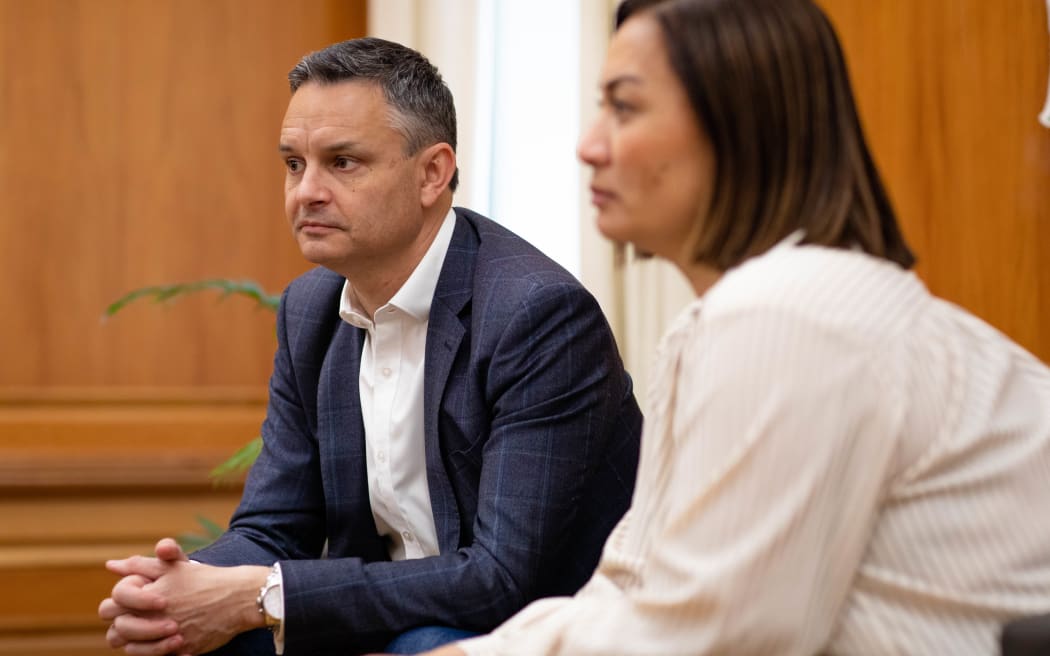
James Shaw was removed as co-leader for nearly two months, but won the position back in a subsequent selection process. Photo: RNZ / Angus Dreaver
National leader Christopher Luxon and MP Chris Bishop being among the first to leap to Shaw's defence did little to quell the discontent.
"I'm sure they had our best interests in their hearts..." Davidson says.
It led to a surreal seven weeks where she carried on as the party's only co-leader, with Shaw still walking Parliament's halls as Climate Change Minister.
Davidson says being the 'sole co-leader' for a time was mostly business as usual, given they both had to attend party meetings and Zoom calls.
"There's a few bits more media to pick up, and going down to the tiles by myself as co-leader, but actually it was a relatively short period of time. I'm pleased for the wellbeing of the party we were able to have as temporary a pause as possible to get us back up and running again. Apart from that I just said to James 'you just owe me a few meetings'."
In the end, Shaw was the only one to put his hand up for the position, and the majority of delegates voted to re-elect him.
Leadership under threat?
Earlier this year party members opted to remove the requirement for one co-leader to be male, instead specifying one must be a woman, and one can be of any gender.
Shaw has previously said he would lead the Greens into government and safely out the other side. Should they be relegated to opposition next year, it could open the door for a possible Davidson-Chlöe Swarbrick co-leadership.
Swarbrick consistently appears in the low reaches of preferred Prime Minister polls, whereas Shaw and Davidson do not feature at all.
Shaw was pleased there were people in the Greens' caucus so highly regarded by the public, but would not be drawn on whether there were plans to pass the baton.
"The only contingency that I'm planning on is getting into government, you have to throw everything at that. It's really important we have that third term."
Between now and that potential third term, though, is an election campaign. Shaw and Davidson are both mindful of the increase in anti-government rhetoric, misogyny, racism, and conspiracy theories, which could boil over during a very public-facing campaign.
"I just think as a country, we've really got to work out what is our strategy for trying to maintain our social fabric over time. Because at the moment, I don't think we've got a very coherent strategy for dealing with it," Shaw says.
He knows better than most what happens when violent rhetoric turns to violent acts, having been the victim of a politically motivated assault on 2019. Tensions since then have only escalated, culminating in the Parliament occupation earlier this year.
"I think that we are at risk as a democracy," he says, "of kind of going down the same path that the US has gone down, and you kind of see where that leads, and it's kind of toxic to a country to have your social fabric decay to that point."
Davidson says Green members are often the first to show up wherever there is harmful rhetoric, and counter it with messages of love.
"That is the community cohesion-building that is happening on the grassroots. People reaching across with positive, inclusive, affirming messages of aroha."
Mixed emotions heading into summer break
While deciding on a party list is still a long way away, the Greens will be going into the election without one of their longest serving MPs, Jan Logie.
The former Parliamentary Undersecretary for the Minister of Justice, who was instrumental in passing a law giving domestic violence victims 10 days paid leave, and worked on the ACC birthing injuries legislation, revealed she would not be contesting the election.
Davidson shed a few tears as she described her colleague's achievements.
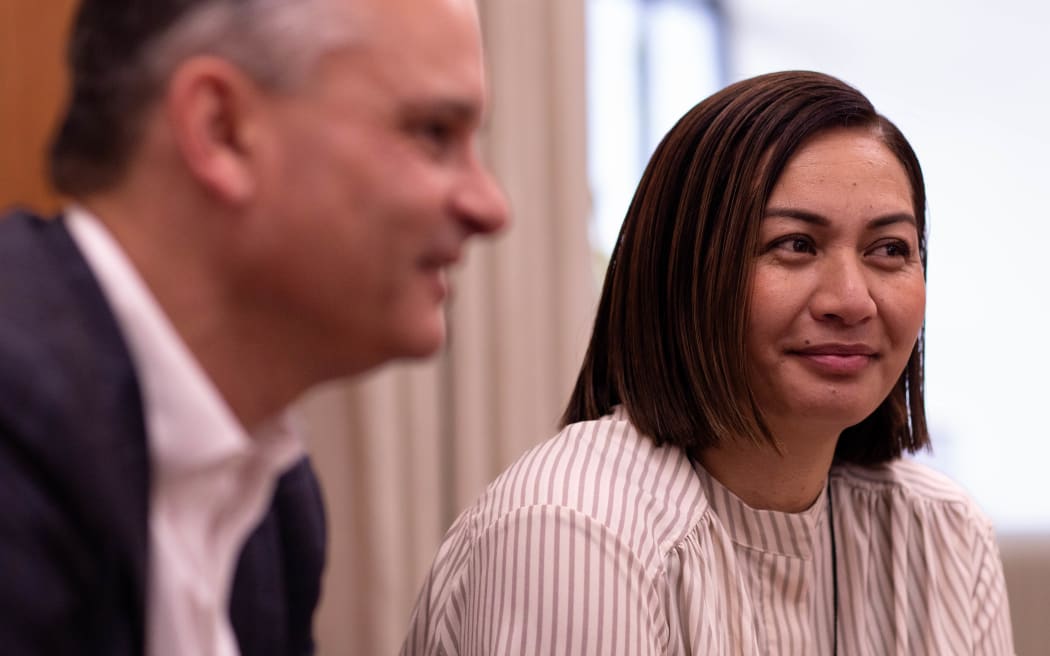
Marama Davidson Photo: RNZ / Angus Dreaver
"Jan is one of those - almost to a fault - humbling MPs and will never ever crow about what she has actually achieved fully. But what people also don't see is the role that she has played in a leadership position in caucus, to the point where I actually think she's leaving an incredible gap."
Shaw is tight-lipped on whether anyone else from his caucus could be stepping down.
"It's not for us to speak on behalf of our colleagues. If anybody else is going to make an announcement about that, that is their choice. And they can do that on their timetable."
With an election year ahead, the co-leaders are well aware of the importance of a restful summer. Davidson is looking forward to being in Hokianga this year, after fears of Covid-19 and putting a burden on the health system kept her away last year.
"If we don't take a good, enduring rest, we won't be in any fit shape to continue the work for planet and people and that's, that's the lens that I use to really dedicate good time to family."
After the most topsy-turvy year of his political career, Shaw's summer plans are simple.
"I'm going to do the same thing I do every year and go to the beach."

